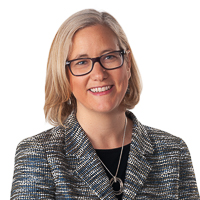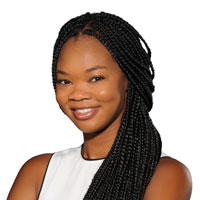Communication from Dean Angell on anti-Black racism and violence
I want to welcome all of the new students beginning their social work careers with us this summer, including our largest-ever cohort of 39 M.S.W. Advanced Standing students and our first ever summer entry cohort of 65 online M.S.W. students. I also want to welcome those of you continuing in our B.S.W., M.S.W., and Ph.D. programs, whether you are enrolled in summer courses or taking a break between semesters. We’re so glad that you all are with us, even though we cannot gather together on our campus for a while longer.

The most important reason for writing to you is to communicate with you regarding the recent events that you are no doubt by now aware of – horrific tragedies that emanate from the anti-Black racism and violence that have persisted in our country for four centuries. In the last several months alone, we have seen blatant examples of a justice system that not only fails to protect Black citizens, but also actively perpetuates violence upon them under the guise of state authority.
In recent days, we have witnessed the collective anguish experienced by Black and Brown communities reflected in public expressions of rage and outrage in cities across the country, including here in Richmond. Incidents like the killing of Breonna Taylor, Ahmaud Arbery, and George Floyd are but only the most recent chapters in a 400-year history marked by white supremacy, dehumanization, and structural violence against Black and Brown communities. These practices are threaded through the very design of many of our social institutions: corrections and law enforcement, education, the judiciary – and the list goes on. Is it possible that this recent series of tragic events could become a tipping point – a spark that motivates our society to mobilize and press for action that, at long last, will dismantle oppressive structures and promote systemic change?
I want to challenge all of us to grapple with what our own role will be – individually and together – in the path toward social transformation. The active promotion of social justice is a core value and ethical imperative of our profession, and that means that when we see injustice, challenging it and fighting to change it is a non-negotiable responsibility. Our profession’s history shows, however, an uneven track record of upholding that ideal.
In the VCU School of Social Work, we have recently begun to reckon with our own problematic track record – ways we have fallen short of our professional commitment to social, economic, and racial justice in our classrooms, our School environment, and in our interactions with one another. In the coming year, a newly created task force composed of faculty, staff, and student representatives will lead us in planning and implementing a schoolwide strategy to reaffirm our commitment to confronting injustice and dismantling oppression in all of its forms and to move forward as a community with intentionality, transparency, and solidarity. As we did at the end of spring semester by holding student forums, we plan to extend opportunities for student input to ensure that your voices, experiences, and ideas are heard and incorporated.
I recognize that all of us – but especially our Black and Brown community members – are feeling sorrow, anger, and a sense of utter exhaustion. This intensity of experience is layered upon an already stressful time as we cope with the impact of COVID-19 on ourselves and our loved ones. As human beings, and as social workers, you are likely asking what we, as individuals, can do right now to help.
Reach out to others who are hurting. One obvious first step is to offer support to one another, especially our Black and Brown community members who bear the disproportionate burden of dealing with the trauma of structural violence and the impact of the pandemic. Support means deep listening, active learning, and bearing witness to the pain others are experiencing.
Take a stand. Demand accountability from the justice system and other institutions that hold power. This can involve large and small ways of taking a stand, such as those suggested in the resources linked below. Get involved in an organization in your community that is mobilizing to press for justice reform and racial equity. In Richmond, some organizations to consider include the Richmond Transparency and Accountability Project, Justice and Reformation, and Richmond for All, but there are many others in this community and around the country. If you know organizations that are doing important work in this area, support them by volunteering, sharing their information with others, and donating to them as your resources allow.
Work on ourselves. Read and learn about how to do the work of anti-racism. If we are to hold institutions accountable, so must we also hold ourselves accountable for our complicity in upholding a system that keeps many of us safe and comfortable, but at the expense of true equity. It is important for those of us who are white, especially, not to rely on our community members of color to take on the burden of educating us. Holding ourselves accountable may take the form of caucus or affinity groups who make a shared commitment to develop critical consciousness about our own role in upholding white supremacy. It also means “calling each other in” and being open to hearing when our words and actions cause pain to others, using those experiences as opportunities for learning and growth. A whole host of resources is provided below, some of which are freely available and others of which may be obtained through VCU Libraries.
Contribute your ideas. We encourage all of you to add your suggestions about actions we can take individually and collectively, now and in the future. Here are two opportunities:
- Assistant Professor Jamie Cage will offer a special Solidarity Session for Black SSW students on Wednesday, June 3, 3:30-5 p.m. I want to ask our non-Black students to respect this time that has been set aside for Black students to process the uniquely painful experiences they are undergoing during the current turmoil. I also included a message (below) from Dr. Cage to our Black student community. Dr. Cage is the faculty adviser to the Association of Black Social Workers (ABSW) student chapter, and wanted to make sure that Black students who may not necessarily be active in ABSW also receive this message of support and solidarity. Thank you, Dr. Cage!
- Associate Dean Sarah Kye Price and I will be holding a SSW-wide virtual listening session on Friday, June 5 (noon-1:30 p.m.) for community expression and dialogue.
- If you prefer, you can also send your suggestions using this form (VCU-only access).
Let us commit to a future in which we can look back and be proud that our profession and our School rose to the challenge of building a more socially, racially, and economically just society.
My best wishes to all of you, in community –
Message from Dr. Jamie Cage
Hello,
I am here to check in with/on you all.

It’s been a difficult week/year. While we are struggling to deal with the disproportionate effect of the Coronavirus on Black communities, we have been reminded that this country has never respected, valued, nor protected Black life. We have been inundated with painful images and videos of Black life being taken, and it is heartbreaking at best.
As Black people, we have been expected to do the impossible. Mourn the constant murder and disregard of Black life, swallow the poison of racism and White Supremacy, and still show up to work and/or school to be model citizens. It’s maddening, and it’s cruel and unusual punishment.
I write to you to remind you to protect your peace. To quote something I saw on Instagram …
“If you need to:
Pray
Advocate
Protest
Learn
Raise Your Voice
Take a Social Media Break
Cry
Rest
Seek Counseling
DO IT.”
Take care of yourself. Take care of your mental and physical health.
I also write to you to remind you that wherever we are and whatever is happening, I stand firmly in the Association of Black Social Workers’ mission to “leverage our collective expertise to strategically develop capacity of people of African ancestry to sustain and flourish,” and to live free from tyranny, White supremacy, and police-sanctioned violence. Know that I am here for you all, and I am extending my support to you now and always.
Let me know what you all need. If you need to hold space together and process everything or sit together in silence, we can find a way to do that.
I will end this with an important reminder, courtesy of some combined tweets, by Brittany Packnett Cunningham:
“My Black is joy.
My Black is power.
My Black is freedom-whether you give me what I am owed or not.
My Black is beautiful.
My Black is human.
My Black contains multitudes.
Our Black has always been too complicated for America-but she will never make me ashamed…
Just stay being your baddest Black self. I love you. I love us.”
Be safe.
Take care of yourself and take care of each other.
Resources
Websites:
- Resources for White People
- Anti-racism resources for white people
- 75 things white people can do for racial justice
- Beyond the Hashtag: How to Take Anti-Racist Action in Your Life
- Showing Up for Racial Justice
- White anti-racism: Living the legacy
- Decolonize Social Work
- SWCAREs: Social Work Coalition for Anti-Racist Educators
- Talking About Race
- MPD150 Report, an “initiative [that aims] to shift the discussion of police violence in Minneapolis from one of procedural reforms to one of meaningful structural change.”
Books/articles/reading resources:
- Uprooting Whiteness [Supremacy & Domination] – Resources compiled by William Frey, Ph.D. student in the Columbia University School of Social Work
- Resmaa Menakem’s book, My Grandmother’s Hands: Racialized Trauma and the Pathway to Mending our Hearts and Bodies. Las Vegas: Central Recovery Press. 2017
- What’s my complicity: Talking white fragility with Robin D’Angelo
- How to be an Antiracist, Ibram X. Kendi
- So You Want to Talk about Race, Ijeoma Oluo
- Me and White Supremacy: Combat Racism, Change the World, and Become a Good Ancestor, Layla Saad
- Mindful of Race, Ruth King
- The Hate You Give, Angie Thomas
- Between the World and Me, Ta-Nehisi Coates
- White Privilege: Unpacking the Invisible Knapsack. Essay by Peggy McIntosh. Additional resource: National SEED Project
Video Resources:
- TED Talk “How Studying Privilege Systems Can Strengthen Compassion” by Peggy McIntosh
- TED Talk “The Power of Privilege” by Tiffany Jana
- TED Talk “There is No Neutral” by Michelle Johnson
- Cracking the Codes: The System of Racial Inequity, DVD at VCU library … and also clips on YouTube
- Ted Talk “How to Deconstruct Racism One Headline at a Time” by Baratunde Thurston
- Race: The power of an illusion
- Bryan Stevenson (Equal Justice Initiative, Just Mercy book and film) interview
- Other social justice-related films that SSW faculty compiled (several are focused on race/racism)
- Ted Talk “Implicit Bias: How it affects us and how we push through”
Comments